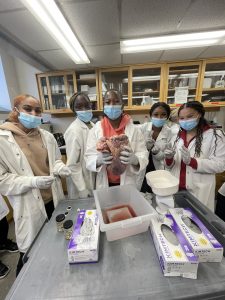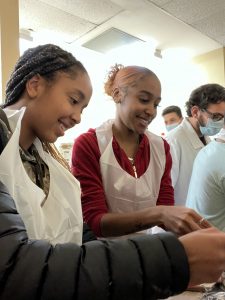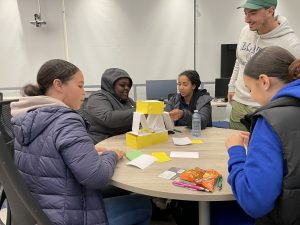By: Dr. Lucy Eum, MD, Dr. Shawna O’Hearn, Director, Office of Community Engagement, Elise Sammons, Manager of Global and Planetary Health, Office of Community Engagement
Dr. Tarun Ghose was a distinguished physician, medical researcher, and educator whose lifelong commitment to advancing cancer research and promoting global health left a lasting impact. Born in India, Dr. Ghose’s career spanned continents, with a particular focus on oncology, radiation biology, and the biological effects of radiation.
In 1958, Dr. Ghose was part of the team that conducted pivotal research in Hiroshima and Nagasaki, Japan, co-authoring a groundbreaking paper that linked leukemia incidence to radiation exposure in atomic bomb survivors. This work earned him international recognition for its critical contribution to understanding the long-term effects of radiation.
His distinguished career continued at Dalhousie University for over two decades as a faculty member. He pioneered research in cancer immunology, authoring 200 papers and giving invited lectures at scientific meetings around the world.
But Dr. Ghose’s legacy extends beyond his scientific work. He was a passionate advocate for global health, peace, and social justice. His deep concerns about the state of the world were reflected in his personal actions and his writings. In a letter written just weeks before his passing in 2020, he expressed his hopes for a better future: “There is nothing but human destruction and devastation going on unchecked around the world. We need to have a minimum standard of human health, we need strong international bodies to promote peace and avoid wars. We also need to ban the sale of weapons of mass destruction. Canada can probably do something about it.”
In recognition of these values, Dr. Ghose left funds to establish this lecture series on global and planetary health, a testament to his dedication to keeping these conversations at the forefront of our work at Dalhousie and in the Maritimes.
A man of intellect, compassion, and vision, Dr. Ghose’s legacy endures not only through his scientific contributions but also through his ongoing influence in the areas of global health, peace, and social justice. His belief that “A life well lived is a beautiful legacy” reflects the profound impact he had on those around him, and his memory continues to inspire through the Dr. Tarunendu Ghose Visiting Scholar in Global Health lecture series established in his name.
On April 2, 2025, the second Dr. Tarunendu Ghose visiting Scholar in Global Health lecture took place, here at Dalhousie University. Dr. Sonja Wicklum’s lecture, “Planetary Health Education, from Burden to Privilege: Addressing the Greatest Health Threat of Our Time,” was a compelling call to action for integrating planetary health into every level of medical education and practice. Dr. Sonja Wicklum is a family physician, educator, and advocate based at the Cumming School of Medicine at the University of Calgary, where she serves as the Director of Planetary Health. She brings over a decade of clinical and academic experience, including work in rural Montana and Ontario. She is the principal investigator of the CIHR-funded Makoyoh’sokoi (Wolf Trail) Program—a holistic wellness initiative for Indigenous women—and holds leadership roles such as Family Medicine Clerkship Director and Co-Chair of the Association of Faculties of Medicine of Canada Planetary Health Committee. Recognized for her contributions with multiple awards, including the Nicole Bruinsma Award for Environmental Leadership, Dr. Wicklum is a national and international leader in embedding sustainability, advocacy, and equity into healthcare.
In her talk, Dr. Wicklum situated Canada—and Alberta specifically—within the global climate crisis, highlighting both the environmental toll of the oil and gas industry and the opportunity for health systems to lead in climate mitigation.
Dr. Wicklum emphasized that planetary health education must be transformative, rooted in systems thinking, social justice, and Indigenous knowledge, and supported by emotionally resonant teaching that inspires connection, care, and action.
A central theme was the pivotal role of medical learners. Medical students and residents are not only eager but essential agents of change, with real impact already seen in clinical practices shifting away from high-carbon interventions like metered-dose inhalers. Dr. Wicklum stressed that students must be empowered through education, dialogue, and inclusion in decision-making. She shared concrete examples from the University of Calgary, including sustainable quality improvement projects and the expansion of the Makoyoh’sokoi (Wolf Trail) wellness program for Indigenous women.
Her talk also highlighted major initiatives in Alberta—despite political challenges—such as greening primary care clinics and using family medicine offices as conduits for climate education. She underscored the urgent need for health systems to model low-carbon care, advocate for policy change, and prepare for climate-related disasters. Above all, she framed this work not as an obligation, but a profound privilege—especially in supporting young people whose mental health is increasingly affected by climate anxiety. Her message was one of hope, responsibility, and the power of healthcare to shape a more sustainable and just future.
To watch the recording of the 2025 lecture and to learn more about our planetary health work please visit our website.














